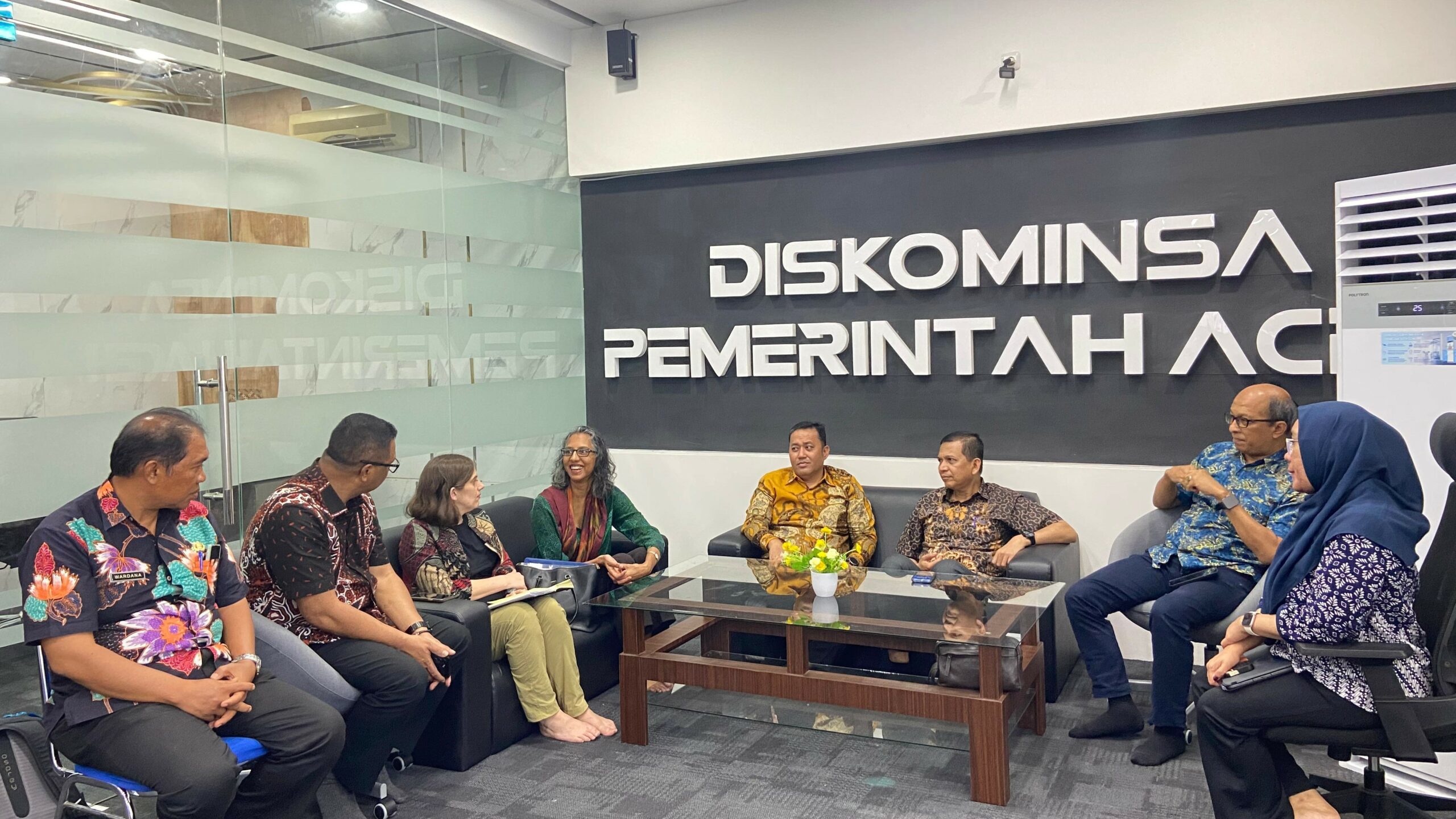Aceh Advances Data Governance

The Aceh Government is strengthening the delivery of basic services by enhancing its data governance through the implementation of the Satu Data policy.
To address challenges related to fragmented data systems, the Aceh government has established platforms such as the Village Information System (SIGAP) and the Aceh Open Data Portal. In collaboration with SKALA, the provincial government is strengthening its data infrastructure so that evidence to plan, budget, provide, and monitor basic services is available, accurate and accessible.
On October 10, 2024, Gita Kamath, the Deputy Head of Mission at the Australian Embassy in Jakarta, visited the Aceh Communication, Informatics, and Cryptography Service (Diskominsa) to learn more about how Aceh is improving the quality of data available on its provincial Data Portal, particularly data on the fulfilment of MSS (Minimum Service Standard) in basic services. This effort is central to strengthening data collection and governance frameworks that form the basis for evidence-based service delivery across the province.
Strengthening Aceh’s Village Information System (SIGAP)
A key focus of the government’s efforts is the expansion of the Aceh Village Information System (Aplikasi Sistem Informasi Gampong or SIGAP) which streamlines data collection and management across Aceh’s 23 districts, 290 sub-districts, and 6,500 gampongs or villages. SIGAP helps to enhance updates to village population data which provides a strong foundation for effective planning, implementation, and evaluation of compliance with Minimum Service Standards. To catalyse improvements to SIGAP, the Aceh Government, in collaboration with SKALA, has partnered with eight local universities through the SIGAP Thematic Community Service program. To date, 2,622 students have participated in implementing SIGAP in over 1,000 villages in Aceh. The initiative has successfully accelerated the collection and use of village-level data for informed decision-making at both the local and provincial levels.
Strengthening MSS Data Management
In addition to the strengthening SIGAP, the Government of Aceh with support from SKALA, has taken other significant steps to improve data management for the implementation of MSS in basic services. MSS refers to a set of benchmarks defined by the central government that outline the minimum acceptable levels of service that must be provided in sectors such as healthcare, education, and social services. These standards ensure that all individuals receive a baseline level of service and thus promote equity and quality.
A series of Focus Group Discussions were organized to map Aceh’s MSS data including on social, health, and education services, and to foster collaboration between government departments so that data collection is comprehensive and aligned with MSS requirements. Also, through partnerships with local universities, student-led internships have focused on data cleaning to standardise 194 data sets, including data on Gender Equality, Disability and Social Inclusion (GEDSI). These data sets, now available on the Aceh Data Portal, provide a reliable basis for policy development, decision-making, and progress evaluation. Advancements in computer technologies and tools are also making data analysis faster and more accurate. This enables the Aceh Government to make evidenced-based decisions which also helps to ensure accountability to the public and transparency in the development of policy.
Building Capacity for MSS implementation
To strengthen the implementation of MSS, the Government of Aceh has prioritized building capacity at both the provincial and district levels. With technical assistance from SKALA, provincial MSS teams have been equipped to guide and support implementation teams across Aceh’s 23 districts and cities. This support includes the development of Minimum Service Standards Regional Action Plans (RAD MSS) and the establishment of monitoring strategies to gauge how well the plans are being implemented. To date, 15 districts and cities have finalized Regent or Mayor regulations related to RAD MSS, a key milestone in ensuring that higher-level policies are practical and implementable by government within districts and cities.
In addition to these efforts, the creation of the MSS Consultation Clinic and the Data Consultation Clinic has provided dedicated platforms for ongoing technical support and training in data management. These clinics, supported by SKALA, are led by experts in health, education, public housing, public works, and social data management and analytics. The experts provide guidance to district and city government offices, including Communication and Informatics Services, Planning and Development, and other District/City Work Units. Their focus is on strengthening the Satu Data Insight initiative, improving data cleaning processes on the district/city government’s Open Data Portal, establishing the Aceh Government’s data sets, and coordinating efforts to monitor the progress and outcomes of data cleaning.
Through these initiatives, the Government of Aceh is improving its ability to enhance data management practices and deliver essential services. SKALA’s role in providing technical support highlights the importance of collaboration in establishing sustainable, data-driven governance across the province.
To view the data portal in Aceh, please visit:
- https://data.acehprov.go.id/ is Aceh’s Open Data Portal that contains MSS and GEDSI datasets.
- https://sigapaceh.id/ is a platform consisting of data from 6,500 village dashboards, 295 sub-district dashboards, 23 district/city dashboards, and 1 provincial dashboard.
- https://ppid.acehprov.go.id/ is a public information document service platform that is also accessible to people with disabilities.







